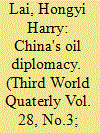| Srl | Item |
| 1 |
ID:
078982


|
|
|
|
|
| Publication |
2007.
|
| Summary/Abstract |
China is now the world's second largest oil consuming nation. China's external quest for oil has thus generated much attention and is believed by many to destabilise the world order. This article attempts to provide an overview of China's external initiatives for satisfying domestic oil demands and to examine the implications of China's oil diplomacy on regional and global political stability. The article suggests that China has taken three steps to satisfy its growing domestic demand for oil - expanding overseas oil supplies from the Middle East, diversifying its importing sources by reaching out to Africa, Russia, Central Asia and the Americas, and securing oil transport routes. This article argues that China's oil diplomacy strengthens its ties with oil-producing nations and complicates those with oil-importing nations. Nevertheless, contrary to pessimistic predictions, China's oil diplomacy has neither upset the USA's fundamental policies towards Iraq and Iran, nor has it generated armed clashes in the South China Sea. China has largely accommodated the USA in these areas and has forged joint efforts in energy exploration with its Asian neighbours, except for Japan. China's benign oil diplomacy can be explained by the minor role of oil imports in its energy consumption and, more importantly, by China's peaceful-rise strategy.
|
|
|
|
|
|
|
|
|
|
|
|
|
|
|
|
| 2 |
ID:
075380


|
|
|
|
|
| Publication |
2006.
|
| Summary/Abstract |
This article analyzes how China succeeded in creating special economic zones (SEZs) and "opening to the outside world." Prudent choice over zone location and leadership, institutional arrangements, and local initiatives combined to produce the success of SEZs. China's SEZs, especially the largest and earliest Shenzhen SEZ, have taken off because of their proximity to and easy connections with neighboring advanced economies, liberal initiatives by able local leadership, administrative and economic arrangements for reform, and a progressive national-opening strategy. In addition, economic freedom at home and peaceful external relations were also necessary for smooth marketization and opening. This lesson may be enlightening for North Korea should it promote SEZs and open up its economy.
|
|
|
|
|
|
|
|
|
|
|
|
|
|
|
|